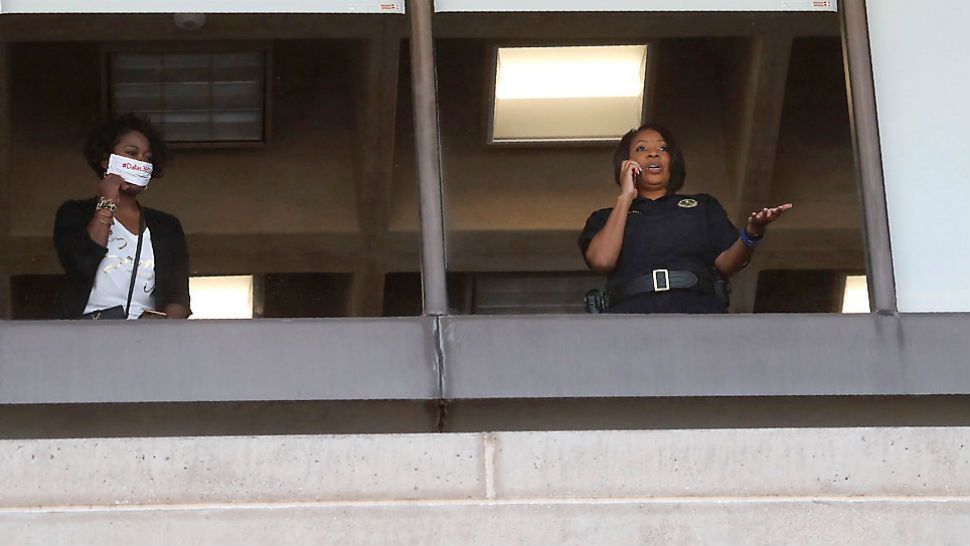DALLAS — With the number of aggravated assaults on the rise in Dallas and the city council proposing to cut the police department’s budget for officer overtime by $7 million, outgoing Dallas Police Chief U. Renee Hall said she wants the city to know one important thing.
“We are not going to compromise the safety of our community,” regardless of the outcome of the budget, Hall said. There will be no officers clocking out in the middle of an incident because their shift is over, she said.
“We will continue to utilize our officers on overtime,” she said. “If that means we come back to you and say we need additional resources, then that’s what we’re going to do.”
Hall’s comments came Monday during a Public Safety Committee hearing in which she was asked by council members what the impact on her department would be if the city approves the cut to her officer’s overtime budget.
Hall last month announced that she was resigning from her post as Dallas Police Chief after three years in office. Hall was the first woman to hold the position. Her resignation comes after criticism for her department’s handling of protests in Dallas after the death of George Floyd, who was killed by two police officers in Minneapolis in May.
Dallas City Council members on Sept. 2 voted to reduce the police department’s budget for overtime by $7 million, or 25 percent, and to divert some $4 million of that money for other city services.
Mayor Eric Johnson opposed the amendment to the city’s budget, saying it was not the time to reduce officer overtime while the rate of aggregated assault and murder was on the rise. The council earlier rejected Johnson’s proposal to cut $6.5 million from the “bloated” salaries of the city’s top 10 percent of city workers with salaries over $60,000.
Dallas this year has seen a 28 percent increase in the number of aggravated assaults and incidences of violence between non-family members compared with the same period last year, according to the Dallas Police Department’s statistics as of Sept. 13.
There have been 156 murders to date this year, a 4 percent increase from 150 murders during the same period last year, according to the same data from the police department.
Dallas’s murder rates are much lower compared to many other large, American cities, according to data compiled by Jeff Asher, the co-founder of AH Datalytics, a private analytics firm based in New Orleans. Asher’s data showed that nationally, the murder rates in 48 of the country’s largest cities was up by 27 percent so far this year.
Police on Monday told council members that they faced a challenge when it comes to addressing the increase in aggravated assaults and incidents of non-family violence in the city.
“One of our main challenges is argument and resolution, and that’s difficult to really weigh in on,” said Dep. Chief Teena Schulz. “We just know that instead of people working things out verbally, it seems that everyone has a gun, and that seems to be the first resource they go to, which is where we are getting the increase in aggravated assaults.”
City Council Member Casey Thomas, who represents District 3, said the city needs to look at the “how and why” behind the increase in such crimes.
“In this time of COVID-19 many people have been locked in their homes, lost their jobs, and many other things like potentially losing their housing,” Thomas said. “We are looking at this budget to allocate funding to dealing with mental health issues, and these are often mental health episodes. These things are important.”
City council members have declined to label such budget proposals as “defunding” the police, but Dallas and Austin so far are the only two Texas cities proposing cuts to their respective police departments. The Austin City Council diverted $150 million from the Austin Police Department's budget to other line items last month when it approved its city budget.
Gov. Greg Abbott criticized the move and proposed taking away Texas cities’ power to annexation in retaliation for any efforts to cut police budgets.
Advocates for divesting from the police department’s budget and using the funds to invest in addressing issues such as poverty, housing, and mental health have said that the multimillion-dollar cut in the police’s overtime budget cut does not go far enough.
“The tentative $7 million divestment from [Dallas Police Department] is in no way enough for ever-increasing needs of our districts, particularly in the midst of a pandemic, and we need to remind Council that we are fighting for nothing less than what we deserve,” a statement from the non-profit Our City, Our Future group said this week.
The organization has proposed allocating $230 million into citywide services, much of which would be divested from the police budget “without cutting into police salaries or pensions,” said Kristian Hernandez, a representative from the organization.
The fact that there’s not even a willingness to trim the fat from the police budget indicates that what we are actually have been saying and has been reverberating through over 100 days of protests is that the city isn’t really listening and that there isn’t any willingness on the council to be courageous on this,” Hernandez said.
Floyd’s death sparked demonstrations across the nation against police brutality and racial injustice. The Dallas Police Department was accused of using excessive force during protests at the end of May and start of June, including the use of pepper spray projectiles and tear gas.
Hall’s own investigation into her department’s handling of the protests pointed to a lack of communication between departments when responding to both peaceful protests and the riots that ensued in some areas of the city. Hall will continue to be the chief until the end of the year.



